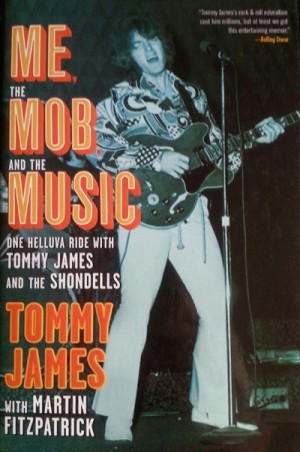Me, The Mob, And The Music - By Tommy James with Martin Fitzpatrick
Author: Tommy James with Martin Fitzpatrick
Publisher: Scribner
Review by Michael Sherer
Review posted: July 2016
(6391) Page Views
 Tommy James
Tommy James
This compelling book tells the story of how Thomas Jackson, later to be renamed Tommy James, played locally in Niles, Michigan for years until a cover of an obscure song called Hanky Panky in ‘64 was cut. One of a few songs he and his group recorded in a local studio, it was to have huge consequences when two years later a radio DJ in Pittsburgh discovered it and began playing it very frequently. It received a rousing response from listeners and Tommy had a big regional hit on his hands. Things snowballed from there, with Tommy taking on a manager who negotiated with several record company executives that were quite interested in signing Tommy and the band. While Tommy went overnight from languishing in small town Michigan to being able to mull over these tantalizing offers from several NYC record company honchos, he was suddenly informed that all of them but one was still interested, that being the infamous Morris Levy and his Roulette Records. It turns out that Levy was a ruthless and feared figure in the industry and had made it clear to all the other executives that Tommy was HIS artist and they had to back off. Not wanting to deal with Levy’s wrath, they did.
Referred to as “The Godfather” of the record business, Levy had been toiling in it since the mid ‘50’s after becoming the owner of the most known of all the jazz nightclubs, Birdland, NYC. (Named after saxophonist Charlie Parker’s nickname.) Along the way he established close ties to the Genovese crime family and other mob figures, earning him this dubious title. Levy’s Roulette hadn’t had a hit for some time, and he wasn’t going to let this one pass him by. It was still the era of hit singles, although that was soon to change.
Full LP record hits began to take over in ‘68, the same year that FM radio surpassed AM. That’s not a coincidence, as it was FM that was playing much longer songs and even full record sides while AM stuck to the top 40, short single format. FM also sounded far better than the mono AM. In addition it had come time for artists to either write their own material or be considered hokey and passe. The Beatles were a big catalyst for this change. Publishing rights and royalties from these original songs is where Levy made a fortune, whereby he hardly payed the artists (or didn’t pay at all) and acquired the publishing of many other labels from their bosses, namely of George Goldner in card games where Goldner needed to sell to pay his gambling debts.
A running and pathetic joke in the industry was that the office of the man that paid royalties to Roulette’s artists was the quietest place in the world because nothing was happening. It all had to be signed off by Levy, and he wouldn’t do much of anything with that. He was known to crack “You want royalties? Go to England.” Tommy and his group was a case of an artist being able to cater fully to both the past singles world and the new one described here, coming on the scene in a very interesting and transitional period.
The book’s central theme is the highly complex, multi faceted relationship between Tommy and Levy. Tommy and his group The Shondells was Roulette’s biggest money maker with many hits coming in, such as “I Think We’re Alone Now,” “Crimson And Clover,” “Money Money” and “Crystal Blue Persuasion.” But as noted, Levy wasn’t paying Tommy, let alone the band, their due royalties. He would stall and make excuses, often that studio costs had to be recouped, which in reality had already happened. Instead Levy would occasionally have his secretary Karin write Tommy a check for typically ten thousand dollars. This was only a tiny fraction of what he was owed, though. For years and years Tommy’s great frustration with not being paid weighed very heavily on him, but at the same time Levy became like a mentor and father figure to him, as well as giving Tommy total creative freedom with his records and providing an exciting and educational atmosphere at the offices where the eager student of the business spent much time. And then there were the industry parties.
Greatly in part from Tommy’s frustrations with Levy, he had personal struggles for many years. He did overcome them, however. Along the way Tommy toured the world and had a hell of an adventure. It’s all documented in this book. Also included are photos of Tommy through the decades. Now 50 years on since Hanky Panky jump started Tommy’s entire career, it’s a good time to read how it all unfolded. I highly recommend this book with it all told from the man himself.
Tommy James with Martin Fitzpatrick Online
• Website • Facebook • Book on Amazon • EBook on Amazon